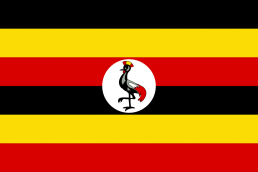Uganda - Facts & Figures.
34,856
POPULATION (2014)
241,038
AREA (SQ KM)
52
MALE LIFE EXPECTANCY
53
FEMALE LIFE EXPECTANCY
History
The Republic of Uganda is a landlocked country in East Africa. It is bordered on the east by Kenya, on the north by Sudan, on the west by the Democratic Republic of the Congo, on the southwest by Rwanda, and on the south by Tanzania. The southern part of the country includes a substantial portion of Lake Victoria, which is also bordered by Kenya and Tanzania.
Uganda takes its name from the Buganda kingdom, which encompassed a portion of the south of the country including the capital Kampala. The people of Uganda were hunter-gatherers until 1,700 to 2,300 years ago, when Bantu-speaking populations migrated to the southern parts of the country. Uganda gained independence from Britain in 1962.
Yoweri Kaguta Museveni (born c. 1944) has been President of Uganda since 26 January 1986. Museveni was involved in a war that deposed Idi Amin, ending his rule in 1979, and in the rebellion that subsequently led to the demise of the Milton Obote regime in 1985. With the notable exception of northern areas, Museveni has brought relative stability and economic growth to a country that has endured decades of government mismanagement, rebel activity and civil war.

In the mid-to-late 1990s, Museveni was lauded by the West as part of a new generation of African leaders. His presidency has been marred, however, by invading and occupying Congo during the Second Congo War (the war in the Democratic Republic of Congo which has resulted in an estimated 5.4 million deaths since 1998) and other conflicts in the Great Lakes region.
Rebellion in the north of Uganda by the Lord’s Resistance Army continues to perpetuate one of the world’s worst humanitarian crises. Recent developments, including the abolition of presidential term limits before the 2006 elections and the harassment of democratic opposition, have attracted concern from domestic commentators and the international community.
It is a member of the African Union, the Commonwealth of Nations, Organisation of the Islamic Conference and East African Community.
Health
Uganda has been among the rare HIV success stories, one of the reasons being openness. It has been reported that 95% of all Ugandans ages 15–49 claim to practice monogamy. This is supported by the findings of a 2006 study that modern contraceptive use in Uganda is low. Infant mortality rate was at 79 per 1,000 in 2005. Life expectancy was at 50.2 for females and 49.1 for males in 2005. There were 8 physicians per 100,000 persons in the early 2000s.
Uganda’s elimination of user fees at state health facilities in 2001 has resulted in an 80% increase in visits; over half of this increase is from the poorest 20% of the population. This policy has been cited as a key factor in helping Uganda achieve its Millennium Development Goals. However, a major problem for many people is the cost of drugs, which have to be paid for. This means that for serious illnesses such as cancer, people often depend on local healers.
Uganda suffers from high levels of malaria transmission. Children and pregnant women are most affected; malaria causes almost half of all deaths in under-fives and almost a third of deaths during pregnancy. Simple measures such as mosquito nets are not used universally – everyone has malaria from time to time.